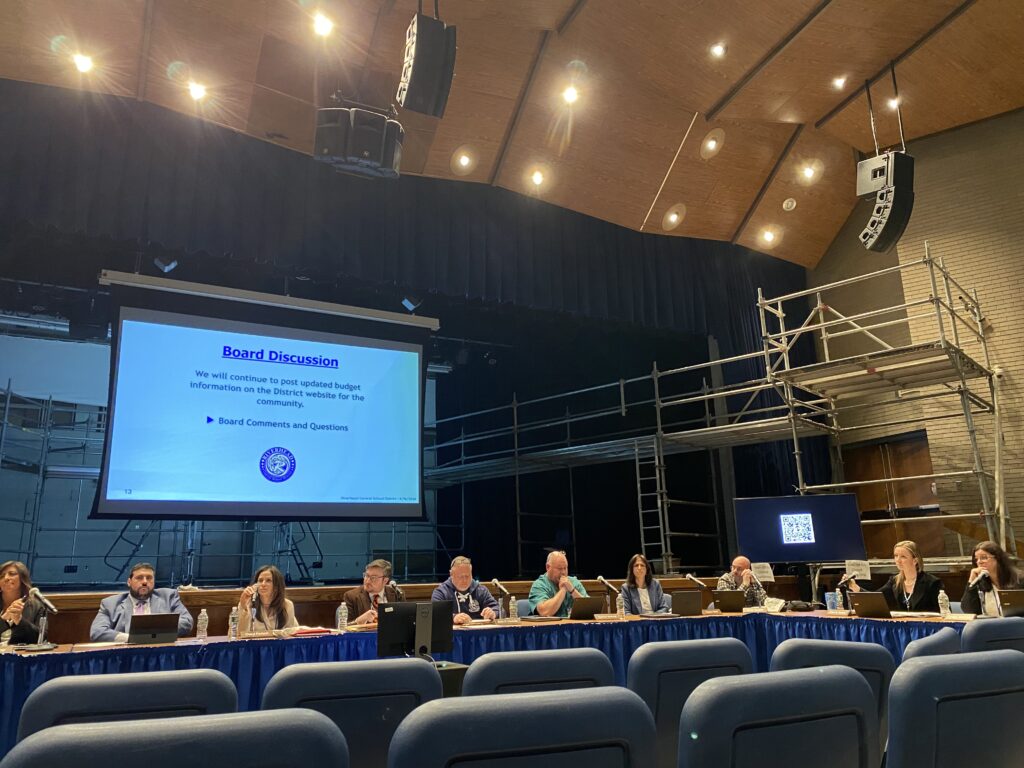Guest Spot: A pie in the face, or worse?
BY MARGE LAWRENCE & BARBARA OLSEN
When a day doesn’t go by without a newspaper article on the effects of devastating cuts in education or mass teacher layoffs, it warmed our hearts last Friday to see an “Our Towns” article in Newsday about Roanoke Avenue students recently reaching a reading milestone.
The principal believed it would be “easy as pie” for the students to read 50,000 minutes outside of school in a week. Last Saturday’s Newsday and last week’s News-Review both ran photos confirming the students’ success — and the dastardly deed of a pie thrown in the principal’s face!
Newsday quoted the principal as saying, “Reading weeks are a great vehicle to promote the love of reading and the use of the library.”
But please tell us this: Why has the four-day librarian position at Roanoke been excessed and the library aide position abolished? One district administrator has told us that the “library is a luxury.”
Not the case.
Today, a “literacy” curriculum forms the core infrastructure of a K-4 student’s day. Teachers don’t have the room and districts can’t afford to provide every classroom with the materials needed to meet this goal, so the school librarian purchases, catalogs and maintains — and the school library houses and makes available — the materials that support the literacy curriculum through multiple curriculum areas.
Students need a school library for access to books and information that build on their newly developed skills or interests — especially if their homes are not literature-rich or they don’t often go to the public library.
Another district administrator told us the principal “has to be creative.” That’s a great idea when you have something to work with! The old adage, “I have done so much for so long with so little that I can do anything with nothing” is not going to work here.
Pulling staff from other buildings is not the answer. Here’s why: Say your building has 400 students. A school librarian sees all the students in the building for library and possibly computer lessons each week. She teaches a lesson that reinforces classroom learning, shows them how to use the library and helps them to find a book to check out. The library aide, meanwhile, has checked in their returns and shelved the books, and checks out their new books. Happens every 40 minutes. Let’s say in your K-4 building, there are 80 kids per level. K-2 takes a book a week, which means 240 that have to be put away. Grades 3 and 4 take two books a week, one for home and one for silent, sustained reading in the classroom. That’s 320 to put away. Twenty classrooms teachers have different curriculum needs, possibly requiring 10 to 20 books per theme. Well, you need time to pull them and time to put them away. That could generate another 400 books.
Who’s going to put these 1,000 books away each week? The district just abolished all the elementary library aides!
The librarian is also expected to order and catalog new materials, discard broken and outdated books and slate others for repair. These last three jobs need to be done on site. Once the decisions are made, the aide can follow through. By the way, the collection is about 10,000 items.
Who’s going to do these tasks? Only someone who has worked the program can understand the workload behind the scenes. The result of cuts is that internally, the records will go to pot and the collection will become dated and will not meet curriculum needs. It is a no-win situation for students, teachers and the program.
What happens when you pull staff from another building? Those school librarians — with larger student bodies, more classroom teacher, more books to shelve (that’s right, folks, a staffer with a master’s degree now is going to be shelving the books) and tasks related to meeting student and teacher curriculum demands — will now have to perform all those tasks in a four-day week at their own buildings, since they may have to give their fifth day to Roanoke. That will be a travesty to their buildings and it will be the end of “continuity” at Roanoke.
So what have we learned? “Equity” is going to hurt all the district’s students, teachers, and program and lack of “continuity” is going to hurt Roanoke’s students, teachers and program. We haven’t even talked about the school librarian’s book fair, coordination of author visits or the summer reading program!
Where are the front-line programs, especially those that have been proven through studies to be so critical to the growth of our children?
We are parents, grandparents and taxpayers in this district. We have been privileged to work with your children and see firsthand the spark of newly acquired skills grow into a lifetime of learning. We are passionate about the importance of reading and school libraries even though we are retired. We want the public to know about the decisions that are affecting our youngest children. We’ve taken our stand, now you take yours!
Ms. Lawrence and Ms. Olsen are former Riverhead School District librarians.








